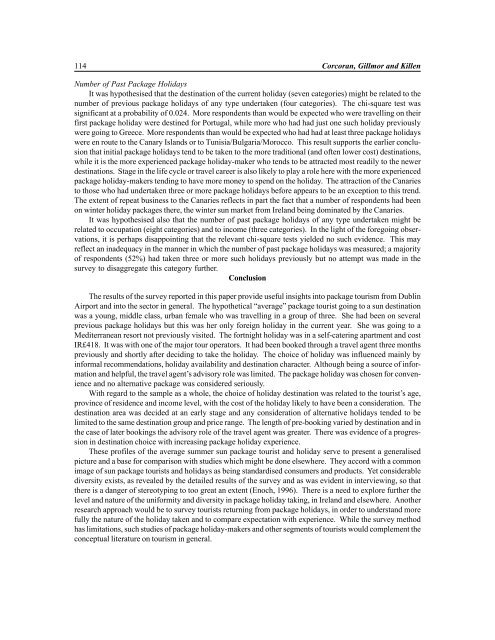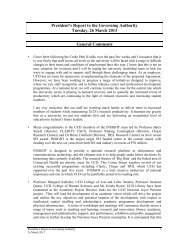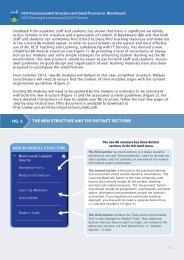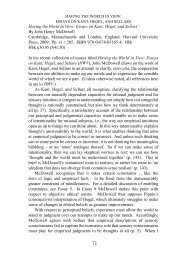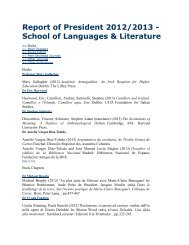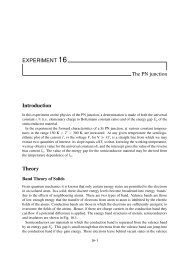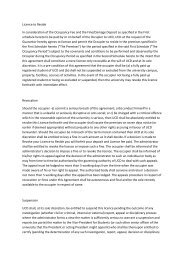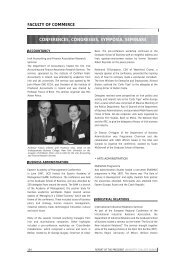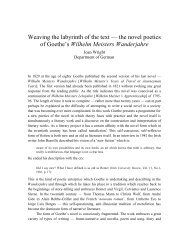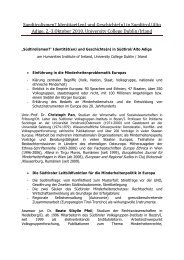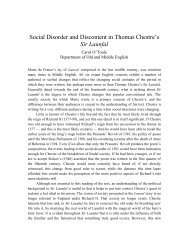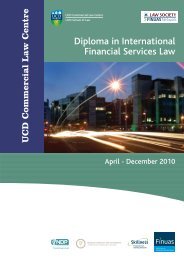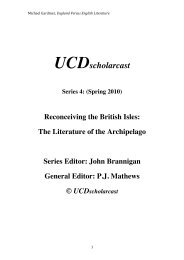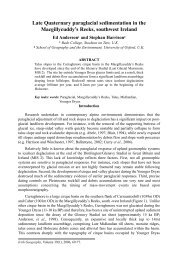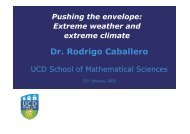An analysis of summer sun tourists - outbound package holidays ...
An analysis of summer sun tourists - outbound package holidays ...
An analysis of summer sun tourists - outbound package holidays ...
You also want an ePaper? Increase the reach of your titles
YUMPU automatically turns print PDFs into web optimized ePapers that Google loves.
114 Corcoran, Gillmor and Killen<br />
Number <strong>of</strong> Past Package Holidays<br />
It was hypothesised that the destination <strong>of</strong> the current holiday (seven categories) might be related to the<br />
number <strong>of</strong> previous <strong>package</strong> <strong>holidays</strong> <strong>of</strong> any type undertaken (four categories). The chi-square test was<br />
significant at a probability <strong>of</strong> 0.024. More respondents than would be expected who were travelling on their<br />
first <strong>package</strong> holiday were destined for Portugal, while more who had had just one such holiday previously<br />
were going to Greece. More respondents than would be expected who had had at least three <strong>package</strong> <strong>holidays</strong><br />
were en route to the Canary Islands or to Tunisia/Bulgaria/Morocco. This result supports the earlier conclusion<br />
that initial <strong>package</strong> <strong>holidays</strong> tend to be taken to the more traditional (and <strong>of</strong>ten lower cost) destinations,<br />
while it is the more experienced <strong>package</strong> holiday-maker who tends to be attracted most readily to the newer<br />
destinations. Stage in the life cycle or travel career is also likely to play a role here with the more experienced<br />
<strong>package</strong> holiday-makers tending to have more money to spend on the holiday. The attraction <strong>of</strong> the Canaries<br />
to those who had undertaken three or more <strong>package</strong> <strong>holidays</strong> before appears to be an exception to this trend.<br />
The extent <strong>of</strong> repeat business to the Canaries reflects in part the fact that a number <strong>of</strong> respondents had been<br />
on winter holiday <strong>package</strong>s there, the winter <strong>sun</strong> market from Ireland being dominated by the Canaries.<br />
It was hypothesised also that the number <strong>of</strong> past <strong>package</strong> <strong>holidays</strong> <strong>of</strong> any type undertaken might be<br />
related to occupation (eight categories) and to income (three categories). In the light <strong>of</strong> the foregoing observations,<br />
it is perhaps disappointing that the relevant chi-square tests yielded no such evidence. This may<br />
reflect an inadequacy in the manner in which the number <strong>of</strong> past <strong>package</strong> <strong>holidays</strong> was measured; a majority<br />
<strong>of</strong> respondents (52%) had taken three or more such <strong>holidays</strong> previously but no attempt was made in the<br />
survey to disaggregate this category further.<br />
Conclusion<br />
The results <strong>of</strong> the survey reported in this paper provide useful insights into <strong>package</strong> tourism from Dublin<br />
Airport and into the sector in general. The hypothetical “average” <strong>package</strong> tourist going to a <strong>sun</strong> destination<br />
was a young, middle class, urban female who was travelling in a group <strong>of</strong> three. She had been on several<br />
previous <strong>package</strong> <strong>holidays</strong> but this was her only foreign holiday in the current year. She was going to a<br />
Mediterranean resort not previously visited. The fortnight holiday was in a self-catering apartment and cost<br />
IR£418. It was with one <strong>of</strong> the major tour operators. It had been booked through a travel agent three months<br />
previously and shortly after deciding to take the holiday. The choice <strong>of</strong> holiday was influenced mainly by<br />
informal recommendations, holiday availability and destination character. Although being a source <strong>of</strong> information<br />
and helpful, the travel agent’s advisory role was limited. The <strong>package</strong> holiday was chosen for convenience<br />
and no alternative <strong>package</strong> was considered seriously.<br />
With regard to the sample as a whole, the choice <strong>of</strong> holiday destination was related to the tourist’s age,<br />
province <strong>of</strong> residence and income level, with the cost <strong>of</strong> the holiday likely to have been a consideration. The<br />
destination area was decided at an early stage and any consideration <strong>of</strong> alternative <strong>holidays</strong> tended to be<br />
limited to the same destination group and price range. The length <strong>of</strong> pre-booking varied by destination and in<br />
the case <strong>of</strong> later bookings the advisory role <strong>of</strong> the travel agent was greater. There was evidence <strong>of</strong> a progression<br />
in destination choice with increasing <strong>package</strong> holiday experience.<br />
These pr<strong>of</strong>iles <strong>of</strong> the average <strong>summer</strong> <strong>sun</strong> <strong>package</strong> tourist and holiday serve to present a generalised<br />
picture and a base for comparison with studies which might be done elsewhere. They accord with a common<br />
image <strong>of</strong> <strong>sun</strong> <strong>package</strong> <strong>tourists</strong> and <strong>holidays</strong> as being standardised consumers and products. Yet considerable<br />
diversity exists, as revealed by the detailed results <strong>of</strong> the survey and as was evident in interviewing, so that<br />
there is a danger <strong>of</strong> stereotyping to too great an extent (Enoch, 1996). There is a need to explore further the<br />
level and nature <strong>of</strong> the uniformity and diversity in <strong>package</strong> holiday taking, in Ireland and elsewhere. <strong>An</strong>other<br />
research approach would be to survey <strong>tourists</strong> returning from <strong>package</strong> <strong>holidays</strong>, in order to understand more<br />
fully the nature <strong>of</strong> the holiday taken and to compare expectation with experience. While the survey method<br />
has limitations, such studies <strong>of</strong> <strong>package</strong> holiday-makers and other segments <strong>of</strong> <strong>tourists</strong> would complement the<br />
conceptual literature on tourism in general.


